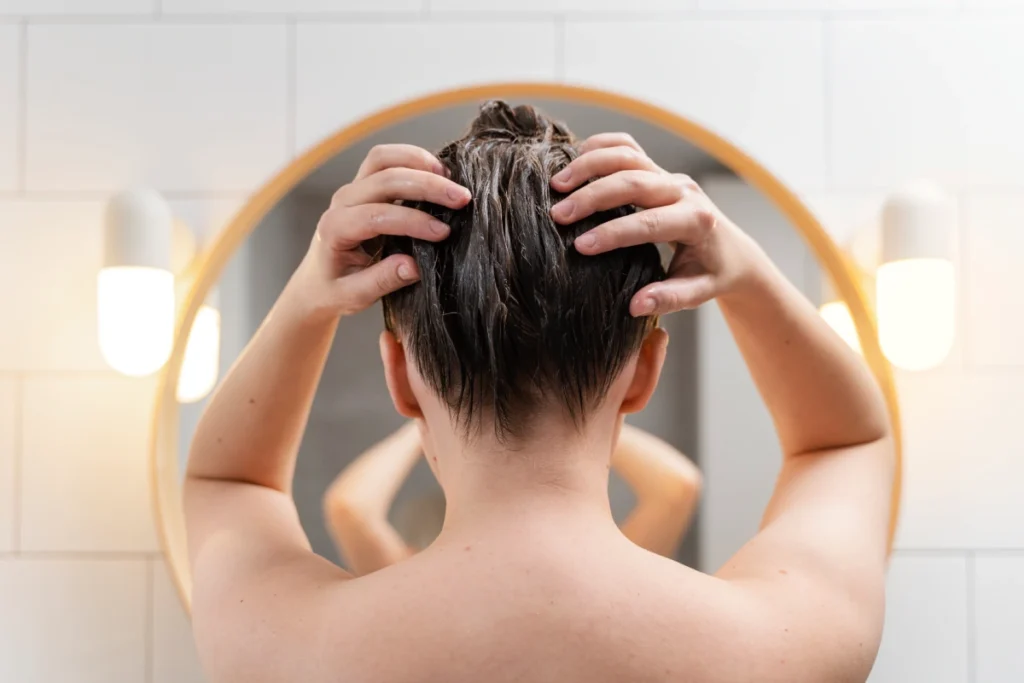Are you struggling with an oily scalp? Here’s how to treat greasy hair and restore the volume.
Do you often wake up with locks that look like an oil slick instead of the bouncy mane you desire? Greasy hair can be a real confidence dampener. If you have dealt with greasy hair, you must be familiar with the challenges that come along with it. Dealing with greasy hair can feel like a vicious cycle–washing your hair too frequently can lead to an overproduction of oil, and waiting a few days between washes can result in a greasy scalp. So, how to treat greasy hair? Before delving into the solutions, it is critical to understand the real cause of greasy hair. Sebum is a natural oil produced by our scalp that helps maintain our hair healthy and hydrated. However, excessive sebum production might result in greasy hair. Genetics, hormonal changes, diet, and stress can all play a role in this imbalance. While treating greasy hair is not easy, I have put together a greasy hair guide to equip you with the tools and techniques to restore volume and vitality to your tresses.
Pick the right shampoo
If your regular shampoo is unable to keep the greasy scalp at bay, it is time to switch to something more potent. A gentle, clarifying shampoo that tackles excess oil without stripping your hair of its natural moisture is the foundation of any greasy hair care routine. Just be careful not to overuse it, since it might dry out your hair. Use it once a week to wash away excess oil, grime, and product residue from the scalp. I also recommend reaching out for products with ingredients like tea tree oil, chamomile, or salicylic acid because these are known for their oil-balancing properties.
Analyse your washing schedule

Are you wondering how to treat greasy hair? Paying attention to your hair-washing schedule might help. While it is tempting to wash your hair everyday if you have a greasy scalp, you must refrain from it. It can strip your hair of its natural moisture and send your oil glands into overdrive. I recommend washing your hair twice a week to keep your scalp clean and oil-free. You can use dry shampoo to help extend the time between washes. But, be sure not to overload on dry shampoo as it can clog your pores, thus exacerbating the problem. I also recommend washing your hair with lukewarm water, as hot water can stimulate sebum production.
Don’t condition your roots
While people with greasy hair still need conditioner, the correct application technique is vital. If you have oily roots, apply conditioner solely to your hair’s lengths and ends, avoiding the scalp. To keep your hair nourished without adding excess oil to the roots, I recommend using a lightweight, oil-free conditioner.
Exfoliate your scalp
Do you want to learn how to treat greasy hair? Incorporate scalp exfoliation into your skincare routine. Neglecting scalp exfoliation can lead to clogged follicles, product buildup and oily scalp. Regular scalp exfoliation not only promotes a healthy scalp but also helps in the regulation of sebum production, which is essential in the battle against greasy hair. Be super gentle when exfoliating your scalp to avoid irritation. While choosing scalp scrubs, I recommend picking the ones with hydrating ingredients. Exfoliate your scalp once every few weeks. Avoid over-exfoliation because this may throw off the pH balance of your scalp. Excessive exfoliation can also deplete the scalp’s natural oils, resulting in increased oil production–the opposite of what we are aiming for.
Manage stress

Are you stressing about work deadlines? Did you know that stress can have a direct impact on your hair health? When we are stressed, the body produces a hormone called cortisol. When our cortisol levels rise, the sebaceous glands in our scalp can get stressed as well, and go into overdrive. As a result, they produce and release more sebum, resulting in oil buildup. Do you want to learn how to treat greasy hair? I recommend managing your stress levels to keep an oily scalp at bay.
Do you want to know more about how to treat greasy hair? Schedule a consultation with me here.
